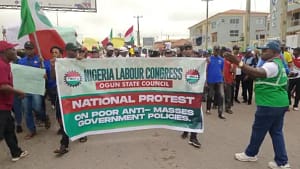NLC Insists on Strike Despite govt’s Overtures as New Tax Regime Commence.

Ahead of tomorrow’s two-day nationwide warning strike marshaled by the Nigeria Labour Congress (NLC), its third since the removal of fuel subsidy in June, public schools, hospitals, seaports, and airports, among other public institutions have expressed readiness to mobilise workers to down tools across the critical sectors.
This is just as about 52 NLC affiliates across the country have stepped up mobilisation for total shutdown, directing their members to commence withdrawal of services over Federal Government’s failure to establish essential structures to address sufferings and hardship in the country.
Insisting that the warning strike would hold as scheduled without the drama of last-minute suspension, NLC President, Joe Ajaero, said the strike was necessitated as a result of government’s deliberate neglect and disregard to engage relevant stakeholders through the channel of social dialogue.
He said the Federal Government refused to engage and reach an agreement with Organised Labour on critical issues on the consequences of the hike in prices of petroleum, which has unleashed massive suffering on Nigerian workers and the masses.
Circular on withdrawal of services obtained by The Guardian from some of the affiliates, including the Maritime Workers Union of Nigeria (MWUN), National Union of Banks, Insurance, and Financial Institutions (NUBIFIE), National Union of Road Transport Workers (NURTW) and the National Union of Electricity Employees (NUEE), among others, urged all national, states and chapter executives to begin mobilisation in total compliance.
They said this was to dissuade the government from intimidatory tendencies towards the unions, as well as put measures in place to stop the deterioration of the nation’s economy and the masses’ suffering.
A notice signed by the Secretary-General of MWUN, Erazua Oniha, directed all members in the ports, jetties and terminals, as well as all oil and gas platforms nationwide to ensure active participation.
For NUBIFIE, its General Secretary, Mohammed Sheikh, said the directive was imperative to get the needed attention of the government and its moves in meddling into the affairs of unions.
Similarly, in the telecommunications sector, General Secretary of Private Telecommunications and Communications Senior Staff Association of Nigeria (PTECSSAN), Okonu Abdullahi, said members would fully participate in the strike, saying: “We operate in a very sensitive sector. What will happen for now is that because it will be a warning strike, any fault that occurred within the two days will not be attended to.”
THE Minister of Labour and Employment, Simon Lalong, will face his first test when he leads a conciliation team to resolve the industrial dispute between the Federal Government and the Organised Labour. One of the grounds of the warning strike is the occupation of the headquarters of the National Union of Road Transport Workers (NURTW) by security agencies.
A statement by the Director, Press and Public Relations Department of the Federal Ministry of Labour and Employment, Olajide Oshundun, said the meeting will be held at the ministry’s conference room in Abuja.
At the end of its National Executive Council (NEC), which was held in Abuja on Thursday last week, NLC decried what it termed “a renewed onslaught against trade unions and its leadership by the state and its agents across Nigeria.”
The central labour body noted that the police, under the instruction of certain forces peddling the name of President Bola Tinubu, have invaded and illegally occupied the National Headquarters of the NURTW making it difficult for the union to discharge its responsibilities to its membership across the nation.
MEANWHILE, the Federal Government has maintained studied silence over announcing the implementation of the 2023 Fiscal Policy Measures and Customs, Excise Tariff that commenced on August 1 and September 1, 2023 respectively.
President Tinubu had in July, signed Executive Orders deferring and suspending the commencement date of certain taxes contained in the Finance Act 2023 from May 23, to September 1, to ensure adherence to the 90 days minimum advance notice for tax changes as contained in the National Tax Policy 2017.
Also, is the Executive Order on the Customs, Excise Tariff (Variation) Amendment Order, 2023, which deferred the commencement date of the tax changes from March 27, 2023 to August 1, 2023.
The Federal Government had imposed 10 per cent tax on the disposal of digital assets including cryptocurrency as well as increased the Tertiary Education Tax rate from 2.5 per cent to 3 per cent of assessable profits.
The taxes contained in the Finance Act 2023, which took effect on September 1, 2023 in line with Nigeria’s tax policy, also include 0.5 per cent levy on goods imported into Nigeria from outside Africa, Value Added Tax (VAT) on goods purchased via electronic or digital platforms from a nonresident supplier appointed as an agent of the FIRS and paid by the importer.
Recall that President Tinubu had in July signed four Executive Orders suspending certain taxes, which include, five per cent excise tax on telecommunication services; increase in tertiary education tax from 2.5 per cent to 3 per cent, 0.5 per cent levy on goods imported outside of Africa into Nigeria; increase in excise duties on tobacco, beer, wine/spirit and cigarettes; 10 per cent on Green Tax on Single Use Plastics (SUPs), including plastic containers and bottles; Import Tax Adjustment (IAT) of two per cent on imported motor vehicles of 2000 cc to 3999 and four per cent on 4000 cc engines.
The Finance bill also contains deduction of capital losses on assets for capital gains tax purposes that may be carried forward for a maximum of five years, rollover relief on sale of shares subject to reinvestment of the proceeds within the same year of assessment and deletion of investment allowance on plant and equipment.
Others are tax deduction restored for premium paid in respect of insurance on own life and spouse, application of transfer pricing rules to VAT on transactions between connected persons considered to be artificial or fictitious, companies appointed to withhold VAT at source are to remit such VAT to the FIRS on or before the 14th day of the following month.
Also contained are redefinition of building for VAT purposes to exclude any structure not permanently affixed to land for all or most of its useful life, establishment of a Governing Council, Executive Board, and a Management Team for the Ministry of Finance Incorporated.
Meanwhile all services including telecommunication services are liable to excise tax at rates prescribed by the President, while for the sharing of Electronic Money Transfer (EMT) levy 15% will be remitted to the Federal Government, 50 per cent to State Governments and 35 per cent to Local Governments.
Recall that stakeholders had decried the issue of multiplicity of taxes that has become a major challenge to organised businesses in the country.
The Director General, Nigerian Employers’ Consultative Association (NECA), Adewale-Smatt Oyerinde, had noted that business in the country currently pay over 50 different taxes and sundry charges, among which are: corporate income tax, import duties, export duties, excise duties, rents, capital gains tax, personal income tax, value added tax, stamp duties and property tax.
Others are licences, motor parking fee, motor vehicle fee, withholding tax, land tax, market licence fee, road tax, business premises, dividend tax, NHIS levy, advert fee, regulation fees, the new NYSC levy as well as the regular user charges such as electricity, water, disposal fee, among others.








Leave a Reply